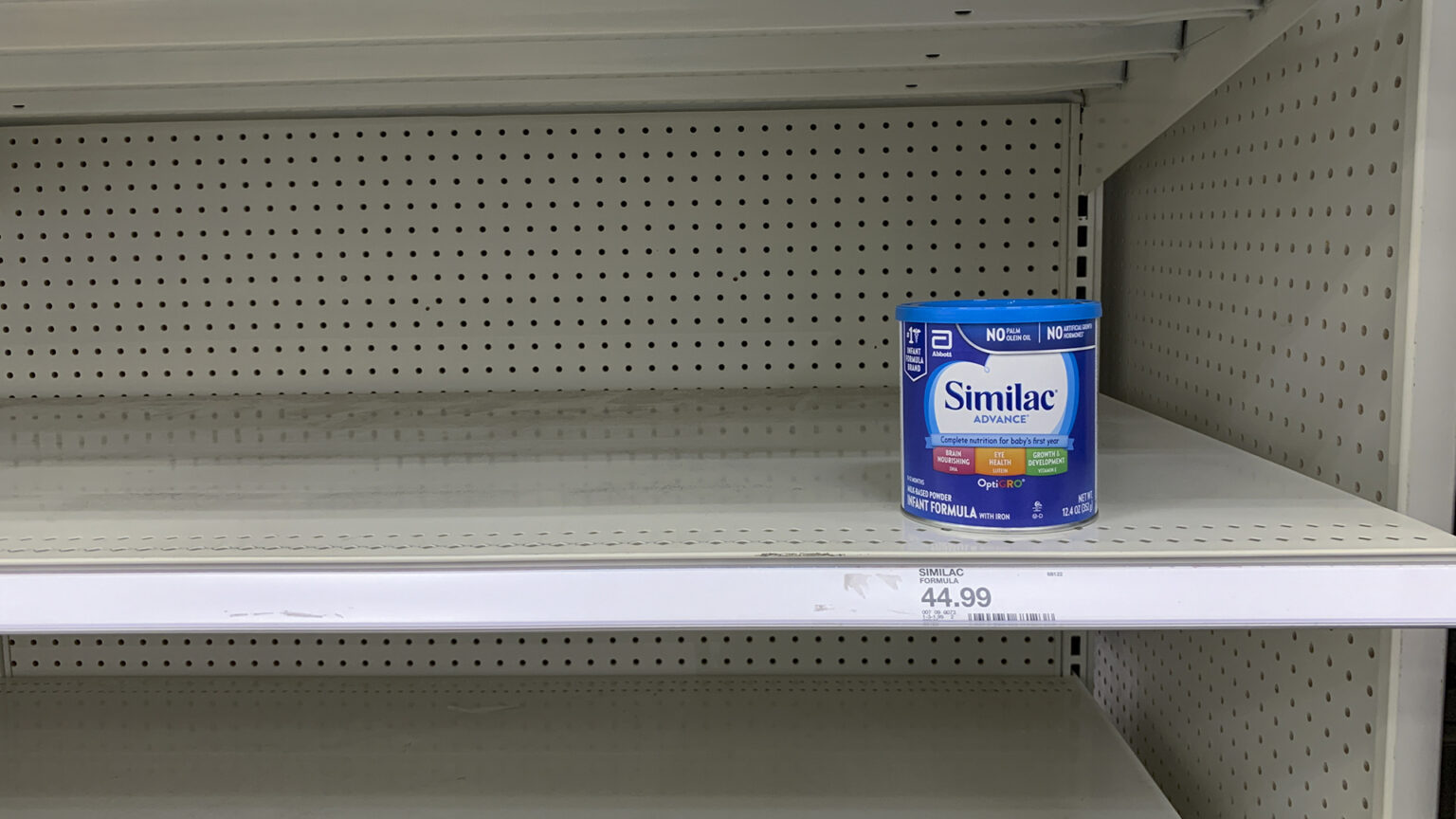What you need to know to feed your baby during formula shortage
Families with infants are facing a shortage of baby formula nationwide, as supply-chain issues and a voluntary recall have stalled production — here's what you need to know.
Wisconsin Watch
July 6, 2022

A lone canister of Similac Advance formula is seen in a Target store in Madison on June 9, 2022. Posted signs ask customers to limit their purchases to four packages of formula each. (Credit: Coburn Dukehart / Wisconsin Watch)

By Matt Martinez, Milwaukee Neighborhood News Service
What’s causing the shortage?
Formula supplies have been hit since the beginning of the pandemic due to stockpiling issues and global supply-chain disruptions.
The shortage was also spurred by a voluntary recall by Abbott Nutrition. In February, the company chose to recall some of its formula because of cases of rare bacterial infections, including from cronobacter sakazakii and salmonella, that occurred after babies had consumed its powdered formula.
The company closed its facility in Sturgis, Michigan, as part of the recall. Investigations by Abbott said there was no link between its formula and the cases. After reopening the plant for less than two weeks, it has since closed again due to flooding. Abbott has not provided updates on when the plant will restart production.
How can I find formula?
Guidance from Children’s Wisconsin said that if you are struggling to find baby formula, you should call IMPACT 211 by dialing 2-1-1. You can also text your ZIP code to TXT-211 for assistance. Operators may be able to help you locate stores or food pantries that have supplies. You can also use the Hunger Task Force’s interactive map or 2-1-1’s website to try to find food pantries near you.
Online groups have also formed to help parents find formula in stock, including Milwaukee Formula Parents, Waukesha County, WI Formula Parents and NE Wisconsin/ Upper Michigan Formula & more!.
What do I need to know to keep my family safe?
Kari Malone, director for the state’s Women, Infants, and Children program, said in an email that the state warned families against unsafe practices, such as trying to make their own formula or giving cow’s milk to infants under 1 year old. She also encouraged families to be careful about getting milk and formula from online sources and to be wary of scammers.
The guidance from Children’s Wisconsin also warned against adding more water to formula, as this can dilute key nutrients.
Families should also be diligent to ensure that they don’t feed their baby recalled or expired formula. To check if the formula’s lot number has been recalled, find it on the bottom of the can and check it with Abbott’s website. You can also find the expiration date on the bottom of the can.
Do not buy or trade for open cans of formula.
Malone said the state is asking families to only take what they need during this time. Malone also noted that some retailers are limiting the amount of formula that families can buy. She called on families to avoid stockpiling.
“This will help ensure other families have access to critical formula for their infants and allow manufacturers and retailers adequate time to restock shelves,” she said.
Malone encouraged families to reach out to their pediatricians if they need help finding formula or any medical advice during this time.
Rebates and alternatives are being offered for some formulas
Abbott pledged to cover the costs of alternatives to its products until Aug. 31. The rebates for WIC recipients will ensure that families in the program can receive alternative supplies free of charge if their state has an exclusive contract with Abbott.
Any WIC recipients with questions should contact their local WIC offices, which can be found here. Wisconsin’s general line for WIC support is 800-642-7837.
The state Department of Health Services provided a list of alternatives for Abbott products in low stock because of the recall.
Imported formulas are also available as alternatives for Similac Advance, including Kendamil Classic, Kendamil Organic and Similac Pure Bliss. Parents and caregivers interested in using these formulas should be aware that they are lower in calories or iron and should talk with their health care provider.
Breastfeeding support services
Dalvery Blackwell, executive director and co-founder of the African American Breastfeeding Network, encourages women who have infants younger than 6 weeks old to consider re-lactating if they are able and said her organization could offer support in doing so. She can be reached at 414-617-3441.
WIC also offers breastfeeding support through specialists and peer counselors, including helping parents access breast pumps and figure out a pumping plan for returning to work.
Erin Ballard, a branch leader with La Leche League Milwaukee West, a Wauwatosa-based chapter of a nonprofit organization that provides lactation support, said her organization can help families connect with resources and offer support for lactation.
To find a local group from Wisconsin La Leche League, visit this map. The Milwaukee West branch can be reached via email at [email protected]. Ballard can be reached at 414-807-9789.
Area health systems also offer support. In Milwaukee, Children’s Wisconsin offers lactation consultation services, which can be reached at 414-266-1757. Ascension Wisconsin also offers services and can be reached at 414-585-1440.
A version of this story was originally published by Milwaukee Neighborhood News Service. Wisconsin Watch reporter Hope Karnopp contributed reporting. The nonprofit Wisconsin Watch collaborates with Wisconsin Public Radio, PBS Wisconsin, other news media and the UW-Madison School of Journalism and Mass Communication. All works created, published, posted or disseminated by the Center do not necessarily reflect the views or opinions of UW-Madison or any of its affiliates.
 Passport
Passport











Follow Us